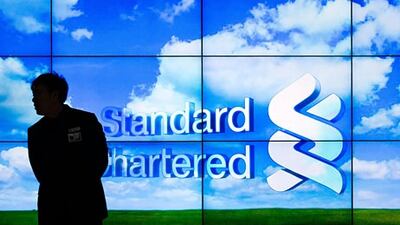Standard Chartered has scraped out a decade of growth in income despite a US$667 million (Dh2.44 billion) settlement with authorities in the United States over prohibited trades with Iran that reined in profitability last year.
The British bank, which generates most of its income from emerging markets and has the second-biggest international banking presence in the UAE, generated profits before tax of $6.87bn, an increase of 1.4 per cent last year compared with a year earlier.
The earnings reflect the 10th consecutive year of improvement and beat estimates of $6.84bn.
“Standard Chartered remains a growth story,” said Sir John Peace, the bank’s chairman. “Clearly the settlements reached with the US authorities had an impact on our profits. But despite this, we are increasing the total amount of dividend paid to shareholders.”
The bank said it was cutting its bonus pool by 7 per cent as a result of the bank’s slower growth and the settlements with US authorities, while its shareholder payout rose by 10.5 per cent.
“There is still work to be done to rebuild public trust in banks, and questions continue to be raised about how banks reward their management and staff,” Sir John added.
Pre-tax profits fell 5.7 per cent in the Middle East and South Asia to $786m last year, the bank said.
“Our UAE business has performed well despite some headwinds,” said Jonathan Morris, Standard Chartered’s chief executive in the Emirates. “We maintain a positive economic outlook for the UAE in 2013 and are well positioned to further grow our franchise as a core bank to many of our customers and clients.”
In the Middle East and South Asia, the bank’s operating profits from consumer financing grew by 43.1 per cent to $209m compared with a year earlier. The gains were led by mortgage income and lending to small businesses, as bad debt levels fell.
The bank's Islamic business in the UAE grew income 30 per cent, while Bahrain also generated 10 per cent more income than in 2011 as the economy stabilised, Standard Chartered said.
HSBC, the bank's global rival, said in October that it would close its Islamic banking operations in many of the markets where Standard Chartered operated.
Operating profits at Standard Chartered’s wholesale lending division in the region fell by 16.1 per cent to $577m during the year.
“Income in the UAE, which generates almost 50 per cent of the income in this region, was down 5 per cent overall,” the bank said. “While client income increased due to higher trade and corporate finance income, this was offset by lower levels of own account income.”
Impairment charges on bad debts in its wholesale division increased by $68m to $265m, which the bank said was driven by a small number of accounts in the UAE.
Standard Chartered was the second biggest underwriter of Middle Eastern bond sales last year after HSBC during a record year for issuance. However, both banks reported lower profits from their investment banking divisions.

